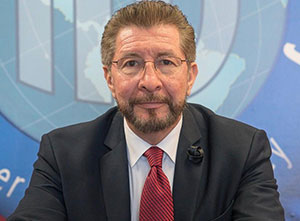Recognize Bolivia as a dictatorship from the system of Cuba, Venezuela, and Nicaragua

By: Carlos Sánchez Berzaín - 10/07/2024
Share:
Lacking the essential components of democracy, the separation and independence of the branches of government, and the rule of law, with over 300 political prisoners, with the application of the State-terrorism system used by dictatorships from Cuba, Venezuela, and Nicaragua, Bolivia’s government continues to be treated as a democracy. Even if we suppose that it has democratic legitimacy due to the elections of 2020, Luis Arce’s regime does not have either democratic legitimacy, or legality in discharging his presidential duties and must be recognized as a dictatorship from 21st Century Socialism.
The first article of the Interamerican Democratic Charter (IDC) establishes that “peoples from the Americas have the right to democracy and their governments have the obligation to promote and defend it. Democracy is essential for the social, political, and economic development of Americas’ peoples.”
The third article of the IDC dictates that “Essential elements of representative democracy include, inter alia, respect for human rights and fundamental freedoms, access to and the exercise of power in accordance with the rule of law, the holding of periodic, free, and fair elections based on secret balloting and universal suffrage as an expression of the sovereignty of the people, the pluralistic system of political parties and organizations, and the separation of powers and independence of the branches of government.” This means that the absence of these components highlights the inexistence of democracy.
Dictatorship is “a political regime that, by force or violence, concentrates all power onto a person, a group or organization and represses human rights and individual basic freedoms.” The concept of dictatorship coincides with the absence of the essential components of democracy given that the concentration of power makes the rule of law, the separation and independence of the branches of government, the pluralistic system of political parties and organizations, the possibility of free and fair elections, to disappear. In dictatorships, the repression of human rights and basic individual freedoms become their indispensable method.
Within this existing and mandatory conceptual and international jurisprudential framework, little room is left to argue or determine if a government, or consequentially a country, is a dictatorship. It is all about observing the objective facts of the country, the conduct of its government, the existence or non-existence of the essential components of democracy. The determination of whether a country is a democracy or dictatorship has significant effects.
We must resonate the sad evidence for the Americas. In the midst of and under the full force of the IDC, Cuba -the only dictatorship of the region- has expanded and has established its model in Venezuela, Nicaragua, Bolivia, and briefly in Ecuador, has a transnational criminal organization called 21st Century Socialism, or Castrochavism. Ecuador has recovered and continues to fight for its democracy. Bolivia continues to be treated as a democracy, despite the fact that notorious cases reveal it is governed by a satellite regime of Cuba and Venezuela. Bolivia now has more political prisoners than Venezuela and Nicaragua and obeys Cuba’s mandates in its foreign affairs. Bolivia has surrendered and is delivering its territory and strategic resources to Russia, China, and Iran as part of the operation that 21st Century Socialism has undertaken. Bolivia is now a narco-State.
The Bolivia in which Luis Arce and Evo Morales wield power, is governed by a constitution crafted by the so-called Plurinational State, forcibly imposed with counterfeiting, crimes, massacres, that was -ironically- certified by the Interamerican Commission on Human Rights. Amongst other consequences, the new constitutional text, has made the Republic of Bolivia, equality among the citizenry, guarantees for human rights, and the universal and secret suffrage, to disappear. It is an instrument for the simulation that allows the holding of “elections under a dictatorship” with a manipulated electoral registry, without impartial judges, with political prisoners and exiles, with a functional opposition, … without democracy.
In the aftermath of the discovered electoral fraud and after Evo Morales’ resignation, the interim government of Jeanine Añez was conformed. Añez took Bolivia to conduct elections using the same counterfeited electoral registry, using the same laws the dictatorship had used, and respecting the impunity granted to the regime, much repudiated by the people. All of these circumstances created the conditions for Evo Morales to impose his presidential candidate, Luis Arce, who went from having near 20% of votes to be elected to “win the elections on the first round with 55.11% of the votes.” Because of his election in 2020 Luis Arce pretends to be a democratic government.
Even if we suppose the elections’ legitimacy -although without consenting to it- Bolivia’s current government does not have either the legitimacy or legality to discharge its presidential duties because it has over 300 political prisoners, over 10,000 exiles, as well as politically persecuted, and operates under the same State-terrorism system of Cuba and Venezuela, under the direction and execution of those dictatorships. Bolivia’s government does not wield power under the “rule of law,” as all the powers of the State are used by the regime, as the impunity for Evo Morales and his accomplices prove it.
Caring for their own interests, democracies from the Americas and the rest of the world should revisit Bolivia’s reality and recognize it as a dictatorship that is now integrated to the threat against international peace and security because of its surrendering and subjection to Russia, China, and Iran.
*Attorney & Political Scientist. Director of the Interamerican Institute for Democracy.
Translation from Spanish by Edgar L. Terrazas
«The opinions published herein are the sole responsibility of its author».